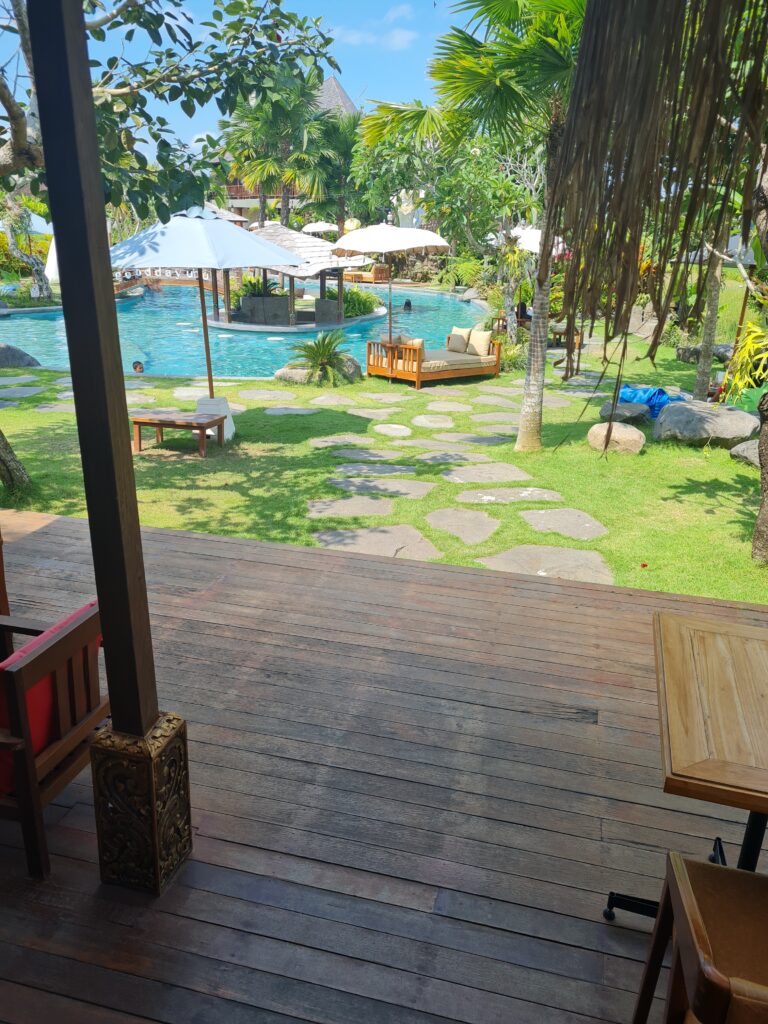Southeast Asia has long been a major hub for digital nomads and remote workers, with two standout destinations: Bali versus Chiang Mai. For nearly three years, I’ve been traveling through and working from this part of the world, experiencing the unique charm of each location.
Bali draws millions of location-independent workers every year, offering a mix of beaches, temples, and yoga retreats, all steeped in Hindu culture. On the other hand, Chiang Mai, with its deep-rooted Buddhist traditions, offers a more laid-back, almost Westernized feel with its shopping and dining scenes.
Both places provide a unique blend of spiritual experiences and practical benefits for digital nomads. They also offer a balance of networking opportunities and spaces to relax.
But the key question remains: Which is better for digital nomads—Bali versus Chiang Mai? Well, that depends.
It depends on your current phase in life, both spiritually and professionally. Do you prefer the beach or the mountains? Are you looking for a buzzing nomad community, or something more intimate and relaxed?
In this article, I’ll share my personal experience of living in Bali versus Chiang Mai, comparing both destinations in terms of affordability, accommodation, things to do, networking, coworking cafes, visa options, and overall vibe.
This guide will help you decide whether Bali or Chiang Mai is the right fit for your digital nomad journey.
Short on time? Here’s a Quick Overview:
Overall Cost of Living: Chiang Mai is more expensive but offers better value.
Healthcare Availability: Chiang Mai boasts high-quality healthcare, Bali barely covers the basics.
Lifestyle: Chiang Mai is urban and modern, Bali feels rural and traditional.
Accommodation Style: Modern Condos in Chiang Mai and lush/traditional villas in Bali.
Food: Chiang Mai is the clear winner, boasting clean local markets and a variety of international food at low costs.
Coworking & Networking: Chiang Mai offers professional coworking spaces and curated networking opportunities, Bali provides a wide array of coworking cafes in a more laid-back atmosphere.
Overall: Chiang Mai provides modern and urban life alongside authentic spirituality. Bali provides a laidback atmosphere with lush greenery.
Book your tours: GetYourGuide.com
Book your hotels: Booking.com
Overall Cost of Living: Bali Versus Chiang Mai
When comparing the cost of living in Bali versus Chiang Mai, they are relatively similar. Of course, you can live on either a tight budget or indulge in luxury in both places. Personally, we tend to find ourselves somewhere in the middle.
Our monthly expenses in both Bali and Chiang Mai range between $2,000 and $2,500 for two people. This includes dining out, groceries, massages, activities, scooter rentals, rent, and the occasional haircut.
However, in terms of overall value, we’ve found that Chiang Mai offers better value than Bali.
While Bali does have affordable accommodations, they don’t always provide great quality or value for the price. I share a complete breakdown of a digital nomad’s budget in Bali here.
In contrast, Chiang Mai typically offers more modern amenities in apartment complexes, often featuring built-in kitchens, pools, saunas, and gyms—all at a comparable cost.
Stop Daydreaming,
Start Building:

This 90-minute masterclass is designed to get you off the sidelines and into action. You’ll leave with a transition plan to walk out of your 9-5 and into a life of freedom:
Health Care Availability: Bali versus Chiang Mai
When comparing health care in Chiang Mai versus Bali, Chiang Mai—and Thailand in general—comes out as the clear winner.
While Bali does offer health care facilities in major cities, including those that cater to tourists (with English-speaking staff, international health insurance acceptance, and good hygiene), the overall quality is mediocre at best.
In fact, many travelers opt to fly to Singapore or return to their home country for serious medical concerns, as Bali’s health care standards often fall short.
On the other hand, Chiang Mai boasts an abundance of highly qualified health care professionals and modern, clean facilities. During my time there, I’ve had check-ups, weekly acupuncture, dental appointments, and more.
The doctors were highly trained, spoke excellent English, and took the time to explain everything clearly, making me feel safe and well cared for.
Speaking of health care, all of my treatments in Chiang Mai were fully reimbursed by my international health insurance, PassportCard.
Though more expensive than average plans, PassportCard is incredibly comprehensive, covering everything from preventative care and emergency treatment to holistic medicine and major illnesses like cancer, and even pregnancy. You can get a free consultation with one of their agents using this link.
Alternatively, we’ve also used SafetyWing in the past. While it doesn’t typically cover non-emergency care, it’s a solid option for handling accidents, emergencies, or even lost luggage.
Overall Lifestyle for Digital Nomads in Bali and Chiang Mai
The lifestyle for digital nomads in Chiang Mai versus Bali couldn’t be more different. While they might seem similar at first glance, the on-the-ground experience is quite the opposite.
Both destinations offer affordable rent, convenient transportation, a mix of local and international food, and a strong presence of spirituality. But that’s where the similarities end.
Bali has a rural, bohemian vibe. Streets can be rundown, and buildings are limited by law to the height of palm trees. Hygiene standards vary, and it’s not unusual to find rice fields and jungle scenes framed by piles of trash. Life in Bali feels laid-back, with outdoor kitchens, villas with pools, and an abundance of Western fusion restaurants.
In contrast, Chiang Mai is more modern and urban. The city is lined with large highways leading to the Old Town, surrounded by sleek apartment complexes and shopping malls. Despite its modernity, Chiang Mai maintains its authenticity through bustling local markets, beauty salons, and a deep-rooted sense of spirituality that feels genuine, not performative.
A clear divide exists between wealthy tourists and locals in Bali, while expats in Chiang Mai seem more integrated into the local community.
Chiang Mai is perfect for focusing on big projects, networking, and enjoying the city’s blend of urban life and spirituality. Bali, on the other hand, is ideal for reconnecting with your soul and embracing a more relaxed, culturally immersive experience.
Though both are magical places to live, their differences make each destination unique for digital nomads. I tend to prefer one destination over the other based on the season I’m in personally and with my business. More on that decision process here.
By the way, if you’re not feeling Bali but are looking for a spiritual place, Chiang Rai might be a great choice for you!
PIN this for later:
Rent: Bali versus Chiang Mai
When comparing accommodations in Bali versus Chiang Mai, the difference is striking. While Bali can be cheaper, the value doesn’t nearly match what you’ll find in Chiang Mai.
In Bali, the typical living arrangement is a villa—a bungalow-style studio or one-bedroom apartment with an indoor bathroom and an outdoor kitchen.
Many come with a pool, but the buildings aren’t air-tight, allowing mosquitos and geckos to wander in. You’re essentially living in the jungle.
Cleanliness and service can vary greatly, and finding well-maintained villas often requires paying above average. We usually pay between $700 and $1,000 for what’s often two studio rooms next to each other.
In another article, I’ve put together the best accommodations in Ubud for digital nomads with a pool. Check out my favorite options here.
In Chiang Mai, accommodations are more modern. The standard is a condo in an apartment complex with air-tight windows, full kitchens, and better amenities, including doormen. The level of service is noticeably higher than in Bali.
We lived 10 minutes outside the Old Town in a modern complex with a large lap pool and a small gym, paying around $750 per month for a two-bedroom apartment during the off-season.
In Bali, I recommend renting in person and being prepared to pay double the average rate if you want clean, well-maintained accommodations with functioning amenities. In Chiang Mai, you can find quality options easily online or with the help of a realtor.
If you’re after a nature-inspired, bohemian lifestyle, Bali is paradise. But if modern amenities and comfort are your priority, Chiang Mai offers far better value.
Want to go even cheaper WHILE gaining in quality of life? Da Nang is your girl.
Affordability of Food and Groceries
When it comes to food, Chiang Mai is the clear winner for local cuisine, while Bali excels in trendy co-working cafés with fusion dishes combining Asian and Western influences.
In Bali, co-working cafés are everywhere, often just a short walk from your homestay. You can grab a light lunch and coffee for $3 to $5 and work there all day. In Chiang Mai, co-working tends to happen in dedicated spaces, where memberships start at around $50 a month.
Eating out in Bali can be incredibly cheap, with market food priced as low as 50 cents. On the other hand, Chiang Mai offers a fantastic selection of mid-tier restaurants. Shabu Shabu-style places, reminiscent of Japanese dining, are a steal, with meals for two costing around $15.
Local markets in Bali, though, are a different story—they’re loud, dirty, and not exactly appetizing. In contrast, Thai markets are cleaner, friendlier, and offer a greater variety of high-quality food. Prices at Thai markets tend to be slightly higher, but the quality and hygiene make it worth it. Plus, I’ve never gotten sick from Thai street food, which I can’t say for Bali.
As for groceries, both destinations can be as cheap or expensive as you make it. Local vegetable markets are budget-friendly in both places, but imported items at grocery stores come with European-style price tags. The upside is that you can still find your favorite Western goodies.
Overall, I find myself eating healthier and more delicious food in Chiang Mai, though my grocery and dining-out expenses in Bali tend to be about one-third cheaper.
Our eating out and groceries budget in Bali are $550 for two people, and are $760 in Chiang Mai. We eat out more in Bali than in Chiang Mai as it’s so cheap there. Produce does cost more in Chiang Mai, but we’ve found the variety and quality to more-than justify that.
Co-Working Spaces and Cafes: Where to Work?
Digital nomads in Bali and Chiang Mai won’t be disappointed with the variety of co-working options. While there’s no clear winner, the vibe is distinct in each place.
Chiang Mai tends to attract focused, freedom-loving entrepreneurs who are serious about their work. Bali, in my experience, draws more soul-searching remote workers. Of course, both places are full of amazing people, so take this with a grain—or two—of salt.
Personally, I’m drawn to Chiang Mai when I need to get things done. In Bali, I love the slower pace and the chance to focus on my big-picture vision.
In Chiang Mai, co-working spaces are plentiful and offer packages that include private or hot desks, coffee, lunch, and even networking events. The city also hosts frequent nomad gatherings, making it easy to find new clients and collaborators.
In Bali, the vibe is more laid-back. Many nomads, myself included, opt for co-working cafés over formal co-working spaces. My favorite ones in Ubud are listed here. While Bali does have co-working spaces, most nomads tend to work from cafés with excellent Wi-Fi. Networking in Ubud happens more at yoga centers, meditation classes, and retreats than at typical business events.
In the end, both places offer unique atmospheres, and that’s part of the beauty of traveling while working, right?
Pin this for later:
Internet Connection: How Reliable is the Wifi?
Internet connections in Chiang Mai and Bali are both reliable. I’ve never had issues with Zoom calls or uploading videos in either place. However, I recommend getting a data package—either unlimited or at least 2GB per day—so you can switch to your hotspot when needed.
In Bali, we usually pay $15 per month for 30GB of data. Outside the main cities, this is a common rate, but in downtown Ubud, merchants may charge up to double. Avoid airport SIM cards– the value isn’t great. One thing that’s annoying with activating a SIM card in Bali is that, weirdly, they take up to two hours to start working. The best SIM provider in Bali is Telkomsel.
In Chiang Mai, getting a SIM card is quick and easy. We paid $10 for unlimited data for an entire month! While our apartment’s Internet wasn’t always stable, we could rely on our hotspot without any issues. The go-to SIM provider in Thailand is TrueMove.
As for café Wi-Fi, I never used it in Thailand, but in Bali, it can be hit or miss.

Transportation: Getting Around
Our go-to transportation in both Chiang Mai and Bali is scooter rental. We pay about $80 per month in Thailand and $100 in Bali. Negotiating helps—Badr typically gets scooters for 40% off the asking price.
In Thailand, police often stop tourists to check for valid driver’s licenses, so ensure yours is approved by the Thai government or get an International one. Keep a copy of your country-specific rules in the scooter, as tourists tend to get ripped off by the police trying to make a quick buck. In Bali, no one ever asked for our license.
For safety, always wear long pants, long sleeves, and a helmet when riding. Don’t hop on a Grab scooter if the driver doesn’t provide a helmet. Traffic in Bali can be chaotic, and Thai drivers love speed, so caution is key to safety.
Alternatives include Grab or hiring private drivers. Bali’s private drivers have somehwat standardized rates, making it easier to avoid scams. In Thailand, Grab is more expensive but also faster and I always felt safer there.

Visa Situation: Ease of Staying Long-Term
Visa regulations in both Bali and Thailand frequently change, so I’ll keep this overview broad to avoid misinformation.
Both countries have increasingly catered to tourism and digital nomads, making it easier to obtain long-term visas. As of 2024, you can apply online for a two-month visa in both Thailand and Indonesia. When we last applied, Thailand required slightly more documentation, such as inbound and outbound flight details, compared to Indonesia.
Our most recent visa applications cost us no more than $100 each, and we had no issues with entry.
Bali offers a relatively straightforward and affordable process for staying up to six months. Thailand also simplifies the process for a two-month stay, with easy extension options both on-shore and via visa runs.
Visa rules can change frequently, so always check the latest information from official government sources before making any plans.
Attractions: What to Do Outside of Work?
Both Chaing Mai and Bali have no shortage of temples to visit and pray at. Yoga studios and massage places are plentiful, and so are opportunities to explore nature and culture outside the cities.
In Bali, there’s plenty do to on the island and on neighboring islands like Penida and Lembongan. Ubud boasts amazing yoga spaces such as Alchemy Yoga, Chiang Mai and Uluwatu are home to beach lovers and surfers. While hiking isn’t exactly a thing in Bali, you can get plenty of exercise in at gyms, Spinning classes, or yoga studios.
Chiang Mai, on the other hand, is surrounded by magical and meditative hikes and waterfalls, like to one up Doi Suthep. You can immersive yourself in learning how to cook at cooking classes, or take weekend trips to the Northern Triangle or Chiang Rai.
I’ve spent two months in Chiang Mai and a cumulative 6 in Bali, and still feel like I’ve barely scratched the surface of things to do.
As for the night scene, no idea. I tend to journal at night. Boring? Maybe. But I’ll say that my glass of wine is much cheaper in Thailand than it is in Bali. Alcohol is Bali is heavily taxed and, thus, shockingly expensive. Hendricks Gin costs over $100 a bottle…
Notably, you go to jail for life if you’re caught smoking weed in Bali, but it’s entirely legal and de-stigmatized in Thailand.
Is Bali or thailand Better for Digital Nomads?
Bali and Chiang Mai offer vastly different experiences, each with its own unique charm and appeal for digital nomads.
Overall, Chiang Mai boasts higher living standards compared to Bali. Spirituality and religion in Thailand feel more authentic and less performative than in Bali.
While Bali is renowned for its lush, stunning landscapes, they are unfortunately marred by trash. In contrast, Chiang Mai presents a more modern and urban environment, but Bali remains unmatched for long, meditative retreats.
So, if you’re after a modern lifestyle at incredibly affordable prices, combined with excellent networking opportunities and spiritual practices, Chiang Mai is your top choice.
On the other hand, if you’re drawn to relaxed working sessions at picturesque cafes, daily massages, and an immersive spiritual journey among fellow travelers, Bali offers a magical experience.
Pin, share, save this article:







Nice comparison with Bali. Thank you for the details.
You’re so welcome!
I mean, both of these options sound amaaaaazing for digital nomads! I think I have heard more about Bali (maybe because so many Aussies go there!? ) But I love the sound of the foodie options in Chiang Mai.
Yes Chiang Mai is the clear winner of Bali when it comes to food – they’re just so very different. I bounce back and forth between both all the time! Yup, Bali is full of Aussie expats. <3
Great overview of these two major digital nomad hubs! I think also being that much closer to Bangkok could be important if you need access to a bigger airport.
You’re right, although Denpasar has become quite the international hub, especially with Singapore being so close!
So what I’ve learned is that Bali is a perfect destination for me in my twenties, and Chiang Mai is a perfect destination for me and my family, lol! Also, the $10 unlimited data sounds like a pretty sweet deal. Over here in Europe, international data is sooo expensive, it’s crazy.
Lol – agreed. And don’t we all have 20s moments in our 40s and family moments in our 20s? Data in Europe is crazy-pants, for sure!
Such a useful guide for someone trying to make the decision for their next digital nomad destination!
Glad this is helpful!